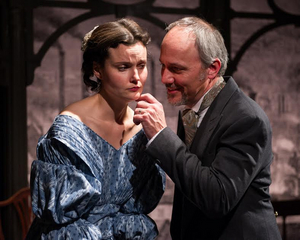Review: HARD TIMES at Washington Stage Guild

If Charles Dickens were working today, he'd likely be enlisted to write for one of the serialized television dramas on which millions feed on and binge. In his day, the equivalent was writing serialized dramas for publication to boost readership.
In the case of "Hard Times," the saga was serialized in his own publication "Household Words" over five months in 1854 before it was published two years later. Though it was the shortest of Dickens' novels, it still had a sprawling cast and considerable twists over many years.
When Stephen Jeffreys condensed it for the stage in 1982, it was tough enough to include most of the story into two long acts; having just four actors play the dozen or more characters almost makes it a parlor trick.
Washington Stage Guild artistic director Bill Largess recalls an earlier D.C. production of it that inaugurated Studio Theatre's Soundstage series in 1988. It made such an impression he decided to try it himself. Luckily he had a cast with the talent to pull off the sometimes complicated story.
Set in a dour, mythical northern England industrial town called Coketown, "Hard Times" is an indictment of a forgotten philosophy called Utilitarianism that thrived in the age of industrialism that stressed numbers and facts over such trivialities as arts and amusement, represented here, oddly, by the circus.
It involves two prominent pillars of the community, a priggish school official named Gradgrind (Brit Herring) and an oafish banker named Bounderby (Steven Carpenter). That Gradgrind's daughter Louisa (Chelsea Mayo) is urged to marry the banker leads to more unhappiness. But eventually things are saved in part by a circus worker's daughter Sissy (Sue Struve).
But there is much more in the work which was divided into three parts, sowing, reaping and garnering - derived from the motto that one reaps what one sows. So there is also a wastrel brother (Herring), a struggling worker (also Herring), a sleazy would-be paramour (Carpenter) a wiley housekeeper (Struve) and a surprise mother (Mayo). And about 10 other characters.
In all, each of the four actors play about five different parts, in addition to delivering, presumably in their own American accents, narration of the action, which is largely unseen.
Therefore there's a lot of dialogue in a production that runs two hours and 45 minutes, and it's not always easy to identify each character since none of them are afforded the ability to actually change costume. The most anyone gets is the addition of a shawl, a string of pearls, a different topcoat, or a distinguishing hat.
Therefore, the quartet must create each character through accent and gesture alone, and it's quite an achievement to alter one's gait, regional dialect or brogue to keep each story line going. And try as he might, Jeffreys' mostly clever adaptation means that some characters have to be absent from some scenes only because the actor assigned them is already on stage playing someone else.
Carpenter has to play the husband and another man trying to seduce Louisa (I guess she has a type). Even more difficult, Herring has to play the brother and the union leader who band together for what might be a bank heist. They actually have conversations where one is absent, because Herring has to play the other one.
But really everybody is very good given their exceedingly difficult task; Herring may get the prize for presenting the most different characters - from the stiff Gradgrind to the moral worker who rejects the union to the wastrel brother. Struve has the greatest range of character age - from the childlike Juju to conniving housekeeper Mrs. Sparsit to Gradgrind's wife. Carpenter is commanding as the blustery Bounderby, the insistent Harthouse and the circus director with a speech impediment Mr. Slary. But Mayo, who was so good with a completely different Southern accent in last season's "Gulf View Drive" at the Stage Guild, is perhaps most memorable as the melancholy Louisa, a victim of the era's grimy industrial patriarchy if there ever was one.
It's great at this time of year to see something - anything - other than Dickens' overplayed "A Christmas Carol." And leave it to the literary-minded Stage Guild to resurrect a work partly championed and partly criticized in its time by the company's go-to playwright, George Bernard Shaw.
"Hard Times" gets strong support at all turns from Largess' brisk direction to the lovely and utilitarian set by Carl Gudenius and Jingwei Dei that approximates a 19th century industrial woodcut. Basmah Alomar has designed beautiful dresses and dashing suits that largely serve the characters in all their various duties. Marianne Meadows' many lighting cues includes some surprise clashes of lightning, and a dramatic trip to the bottom of a mineshaft, but also a lot of instances of actors standing in the shadows of overhead trellises as they narrate.
Dickens' fans who know what they are in for will enjoy the ups and downs of the spirited period drama, even if they will have to do their bingeing all in one sitting.
Running time: Two hours, 45 minutes, with one intermission.
Photo credit: Chelsea Mayo as Louisa, Steven Carpenter as Bounderby in Washington Stage Guild's "Hard Times." Photo by C. Stanley Photography
"Hard Times" by the Washington Stage Guild continues through Dec. 8 at the Undercroft Theatre at the Mount Vernon Place United Methodist Church, 900 Massachusetts Ave NW, Washington. Tickets at 202-900-8788 or online.
Add Your Comment
Videos
